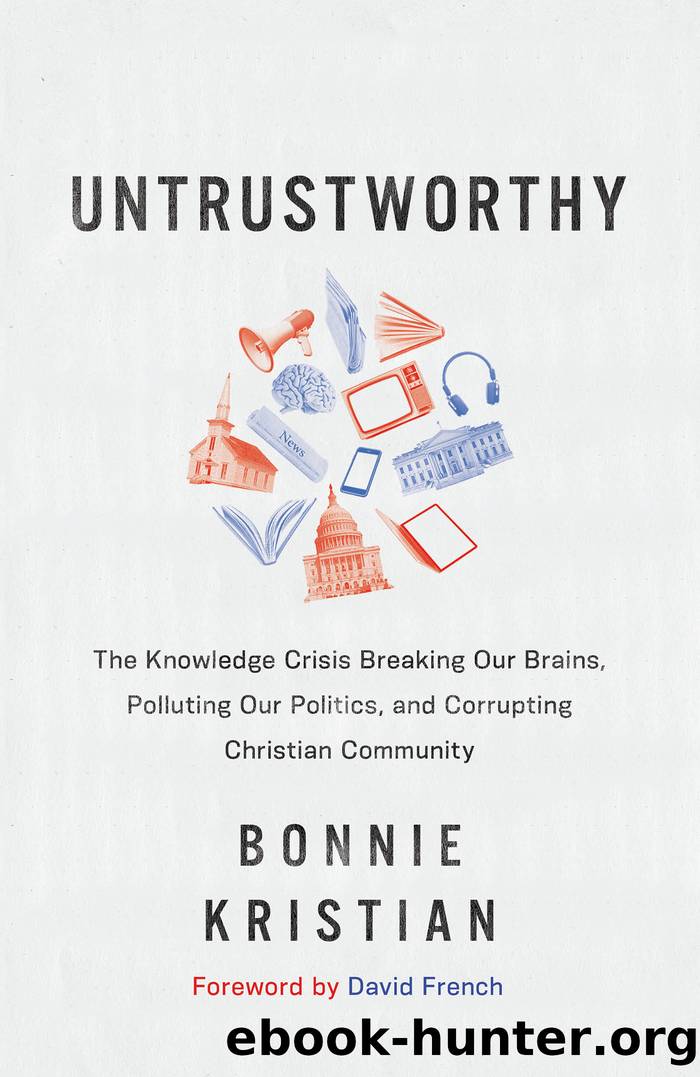Untrustworthy by Bonnie Kristian

Author:Bonnie Kristian
Language: eng
Format: epub
Tags: Christian Living/Social Issues;Truthfulness and falsehood—Religious aspects—Christianity;Truth—Religious aspects—Christianity;Common fallacies;Christianity and culture—United States;REL012110
Publisher: Baker Publishing Group
Published: 2022-08-03T00:00:00+00:00
6
Emotion
Feelings come and feelings go,
And feelings are deceiving;
My warrant is the Word of Godâ
Naught else is worth believing.
Though all my heart should feel condemned
For want of some sweet token,
There is One greater than my heart
Whose Word cannot be broken.
Iâll trust in Godâs unchanging Word
âTil soul and body sever,
For, though all things shall pass away,
His Word shall stand forever!
âAnonymous, but commonly
attributed to Martin Luther
The conservative evangelicalism of my youth didnât take a terribly favorable view of emotion. Feelings are mercurial and untrustworthy, I remember hearing. Theyâre often disconnected from realityâsomething we canât escape, unfortunately, but can work to ignore as an impediment to right thinking.
Faithfulness to God and the truth would be impossible if we succumbed to emotion, I learned, whether through manipulation by other people or the workings of our own deceitful hearts. Jeremiah 17:9âwhich declares that âthe heart is deceitful above all things, and desperately wickedâ (KJV)1âwas a familiar quotation. The Hebrew word rendered as âheartâ in this passage (typically transliterated leb) is a broad term that encompasses the whole inner being, including what we would call the soul, the rational mind, the will, and the seat of emotion. Itâs often the word used, for example, when the Old Testament records that someone âsaid (something) in his heartââthat is, he thought it.2
But when I heard that verse, âheartâ was interpreted as it is in contemporary American parlance. It was understood to refer to the emotive, nonrational parts of us, which meant our feelings were something bad to be overcome by reason and Scripture through the empowerment of the Holy Spirit. Pop culture might tell you to âfollow your heart,â but we would follow the Bible instead.
That context is the reason why, for years, I read Paulâs famous monologue of the divided self in Romans 7 (âwhat I want to do I do not do, but what I hate I do,â he confesses in v. 15) as a battle between the emotional fallen nature and the rational redeemed mind. I donât think anyone taught me that interpretation in so many words, but linking the troublesome, ungovernable part of the self to feelings made sense given what else Iâd been told about emotion. Of course the bad part of you produced the feelings, and the good partâthe part that reflected the image of God and could be sanctifiedâwas the reasoning mind.
The first stanza of the poem located at the beginning of this chapter was familiar to me too. In pithy, proverbial form, it communicates that our changeable feelings are a path to deception, an enemy of Scripture, and, by extension, a hindrance to our relationship with God. Shove those feelings down, if you are thus plagued, by reading the Bible.
I donât think I knew at the time that these lines are typically credited to Martin Luther, an attribution thatâs very probably false. Iâve been unable to find any citation of a specific source in his extensive writings, and anyway, the sixteenth-century German theologian didnât write in rhyming near-modern English. Itâs possible,
Download
This site does not store any files on its server. We only index and link to content provided by other sites. Please contact the content providers to delete copyright contents if any and email us, we'll remove relevant links or contents immediately.
Machine Learning at Scale with H2O by Gregory Keys | David Whiting(4313)
Never by Ken Follett(3957)
Fairy Tale by Stephen King(3399)
Reminders of Him: A Novel by Colleen Hoover(3119)
The Man Who Died Twice by Richard Osman(3079)
Will by Will Smith(2920)
It Starts With Us (It Ends with Us #2) by Colleen Hoover(2367)
Rationality by Steven Pinker(2364)
Can't Hurt Me: Master Your Mind and Defy the Odds - Clean Edition by David Goggins(2341)
Friends, Lovers, and the Big Terrible Thing by Matthew Perry(2230)
The Becoming by Nora Roberts(2203)
The Stranger in the Lifeboat by Mitch Albom(2122)
Love on the Brain by Ali Hazelwood(2078)
New Morning Mercies: A Daily Gospel Devotional by Paul David Tripp(1919)
A Short History of War by Jeremy Black(1848)
HBR's 10 Must Reads 2022 by Harvard Business Review(1844)
The Strength In Our Scars by Bianca Sparacino(1843)
A Game of Thrones (The Illustrated Edition) by George R. R. Martin(1745)
Never Finished: Unshackle Your Mind and Win the War Within by David Goggins(1712)
